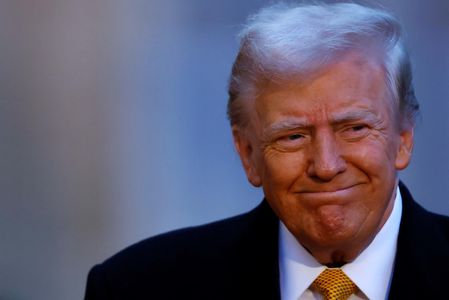President-elect Trump and Republicans on Capitol Hill are unified on the big picture ahead, eagerly backing the Trump agenda on key issues like the border, taxes and energy. But that’s the easy part. The hard part is a split that has emerged among GOP leaders over how and when to turn Trump’s legislative wishlist into law.
Clip: Trump runs into Republican rift over his ambitious agenda
Dec. 13, 2024 AT 8:50 p.m. EST
TRANSCRIPT
Notice: Transcripts are machine and human generated and lightly edited for accuracy. They may contain errors.
Lisa Desjardins: President-elect Donald Trump and Republicans on Capitol Hill are unified on the big picture ahead, eagerly backing the Trump agenda on key issues like the border, taxes, and energy, but that's the easy part. Now, the hard part. Thanks to their razor thin majority in the House and being far short of the 60 votes needed in the Senate to pass bills at will, a split has emerged among GOP leaders over how and when to turn Trump's legislative wish list into law. And, by the way, what exactly is his wish list?
Joining me tonight to take a closer look at Trump's promises and the reality of the present are Peter Baker, The New York Times' chief Washington correspondent, Hans Nichols, a political reporter at Axios and the author of The Hill Leader's Newsletter, Toluse Olorunnipa is the White House bureau chief at The Washington Post, and Ali Vitali is a Capitol Hill correspondent for NBC News, and we're happy to say the newly named next anchor of MSNBC's Way Too Early. Welcome back to all of you. This is a very quality cast of people tonight.
Peter, I want to start with you, and I want to start with a quote in one of your stories from this week. This is what you wrote. You wrote, as he prepares to move back into the White House, President-elect Trump's penchant for extravagant, ungrounded claims will challenge his ability to translate bravado into reality. We are at that moment of both bravado and reality.
What do we know about the exact shape of Trump's agenda going into January and how ready is it for action?
Peter Baker, Chief White House Correspondent, The New York Times: Yes, it's a good question. Look, they've had some time to prepare, right? And as much as he tried to distance himself from the 2025 Project, obviously there's a blueprint there if he chooses to use it, a lot of the people who authored that blueprint now joining his administration.
If you watch the interview he gave to NBC and Meet the Press this week, or read the one in Time Magazine, what you see is a person ready to move on all fronts all at once, right? It's like the movie, Everything All at Once.
And what's unclear is how he actually manages that because, in fact, after four years in office, he ought to know that Washington doesn't actually work that way. There's a certain bandwidth beyond which you cannot take that much action. But he says on his first day, he's going to pardon January 6th rioters. He's going to move on energy. He's going to move on the border. He's going to move on the economy. He's going to do all these things right out of the gate.
And what he's looking to do are things that doesn't require -- don't require a lot of action from Congress right away because I think he does believe that will slow things up. He wants to demonstrate action.
Lisa Desjardins: Let me get to the Congress part, Ali. You and I know these Republicans have been waiting, salivating for years for this kind of opportunity, and they do want to do everything, tax cuts, energy, apparently, now daylight savings is on the board as part of the agenda. But help us with what's really feasible here from what you see.
Ali Vitali, Capitol Hill Correspondent, NBC News: Well, look, they're doing a lot of this through a process called reconciliation. But the key point of this is that everything's got to point back to having a tax incentive or a tax piece to it in order to actually be relevant to a reconciliation bill. So, that means you can't actually do everything everywhere all at once. You have to do things by the parliamentarian's rules.
We've actually just been through this two years ago when we looked at the way the Biden administration tried to leverage the fact that it had both houses of Congress and it wanted to do everything all at once, and we kept waiting for the parliamentarian to say, no, you can't do it this way. Yes, you can do it this way. And then, of course, Manchin and Sinema put their imprimatur on it, and we watched the way that one or two members could really shape the way that this legislation looked.
That's what we're looking at in the Senate, of course, always, but also in the House when you recognize the fact that these very slim margins that they have means that every House member really does get the ability to stand up and say, well, if I don't go for this, or one or two of us don't go for this, then suddenly it becomes very difficult to do.
Hans Nichols, Political Reporter, Axios: Yes. It's really just a question of whether or not there's an individual member of the House that decides that he wants to look and sound and act like Joe Manchin. And if an individual member of the House, or two, depending on the margins, depending on when people leave, they're going to be able to throw a wrench into President Donald Trump's plan.
Now, inside the Trump transition, they're convinced that they can just roll these members and that Donald Trump has a magic wand to force House Republicans in the line. I'm not so sure, but I've been wrong on things in the past.
Toluse Olorunnipa, White House Bureau Chief, The Washington Post: I think that's part of the reason they're focusing so much on the cabinet selection and trying to force some of these senators that are on the fence about some of these controversial picks not to bow down to this pressure that they're facing from the Senate. Because they realize that if Trump allows some of these senators, who are pretty powerful and are pretty well respected in their own states, to buck him on a number of things, then it's going to give leeway to a number of House members and other senators to block him on other things.
So, they are trying to force their hands. They're putting a lot of pressure on some of these senators. There's a whole social media campaign denigrating some of these senators just for asking questions about Trump's nominees.
Hans Nichols: That's interesting, because you seem like, it's like the cabinet process is horse-braking. They're like they're trying to housebreak the senators. And once these senators are broken, according to that theory, then they will be much more pliant to do what the president says.
On all of this, though, there's an enormous amount of things President Donald Trump can do administratively. If he wants to actually have it be durable and have it be lasting, as we've learned from the Biden presidency, you need Congress to come along.
So, yes, you can have a bunch of short-term gains, short-term wins, feel great, it's a sugar high, and after four years, it's not there. When you talk to Trump officials, they want it to be durable, and they want it to be lasting. And for that, they need the votes. And, again, it's unclear if they have them.
Lisa Desjardins: Peter, how much of the Trump agenda, from where you sit is bravado and how much of it is he serious about? And then do other Republicans know the difference?
Peter Baker: Well, it's interesting, right, because he says these things and we don't take them seriously, because they're not serious in some cases, right? He says, I'm going to solve the Ukraine war in 24 hours, and I'll do it before the inauguration. Really? He hasn't told us how he's going to do that, and there doesn't seem to be any move to actually do that.
And in the interview with Time, he began to seem like he was backing away, saying, well, maybe they'll wait until I get in office. So, did anybody actually take that seriously? Are we going to hold him accountable for not doing what we didn't think he was ever going to do in the first place? That's a really interesting question.
A couple other examples, deporting all 11 million people in the country illegally. Keep in mind, during his entire four-year tenure, he only deported less than a million, right? And that was less, by the way, than either Obama or Bush did in a comparable amount of time.
The other one is cutting the federal budget by $2 trillion out of $6.8 trillion a year. We remember how hard it is for John Boehner, for Barack Obama, for any of these guys to cut a few tens of billions of dollars. There's no chance anybody thinks they're going to get $2 trillion out of this budget. And yet we don't take it seriously, but, you know, we expect him to make an effort.
Ali Vitali: But Trump has always gotten the benefit of his words being water. And that's actually something that in my conversations with Democratic sources, especially on Capitol Hill, they recognize the power of being able to kind of play in that nebulous policy space because Trump is not necessarily wed to one policy idea. Certainly, if you're one of the last people who has a conversation with him, which is why the behind the scenes, in the room reporting that all of you all do so well, is so important. You get to know who is influencing him.
And certainly, Republicans are aware of that, but Democrats are very much aware of that too. And I think we'll see them, and we've already seen tempering of their reactions and responses. We were talking about this earlier. It's a little bit less hair on fire than it was a few years ago. But at the same time, they are watching with more knowledge now and they plan to use it.
FROM THIS EPISODE


Clip: What's behind Trump's backpedaling on his promises to lower prices


Full Episode: Washington Week with The Atlantic full episode, 12/13/24

© 1996 - 2026 WETA. All Rights Reserved.
PBS is a 501(c)(3) not-for-profit organization
